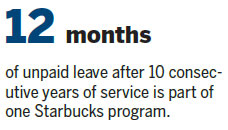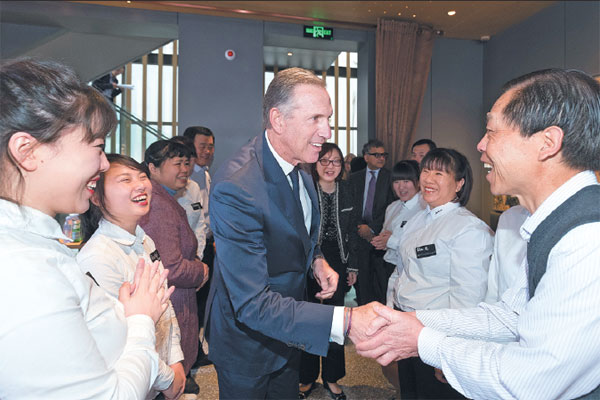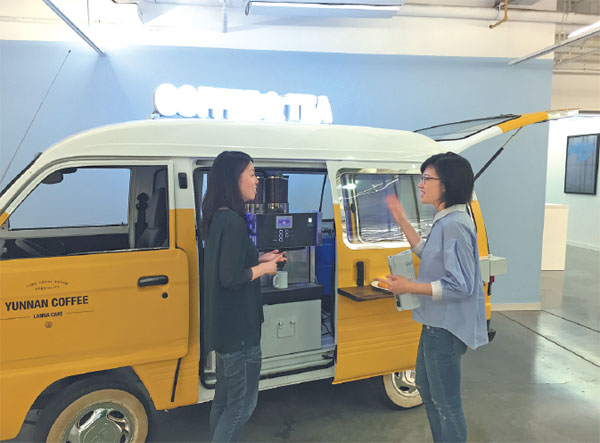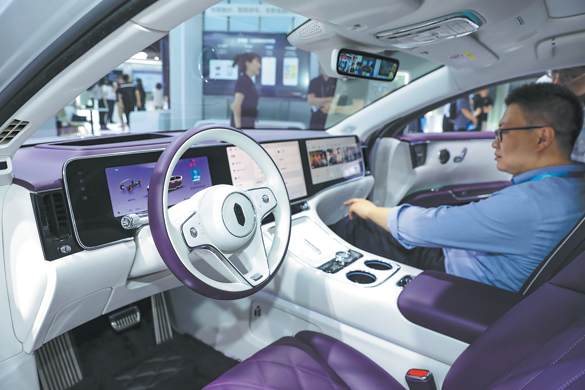Companies cater to young generations

Employee programs offer enhanced benefits to retain workers in highly competitive retail environment
Liu Xinfang, who works as a barista at Starbucks, used to worry about health insurance for her aging parents.
Her father was a farmer from Weinan, Shaanxi province, while her mother worked in a factory before they retired.
Liu, who is in her late 20s, is employed by the world's leading coffeeshop chain in Xi'an, the capital of Shaanxi province.
| Howard Schultz, executive chairman of Starbucks, greets a parent of one employee at an event during which the company announced plans to offer critical illness insurance coverage for parents of staff members. Photos Provided to China Daily |
| Employees at EF Education First chat over a cup of free coffee. Provided to China Daily |
Earlier this year, she was delighted when Starbucks Corp rolled out a parent care program that covers health insurance.
"My father is very happy to hear such good news," says Liu. "Before the plan, I tried to purchase insurance for my father, but he refused."
Starbucks has already financed critical illness insurance for more than 12,000 parents of employees.
"It's a great relief that the company has taken a leadership position to support the health and care of our aging parents," Liu says.
She is among staff members born during the single-child era who face huge financial pressure when looking after their aging parents.
It is hardly surprising, then, that employment packages with healthcare and family care benefits help retain employees in the highly competitive retail sector.
Starbucks, for example, has more than 2,800 stores in about 130 cities in China. The company also has nearly 40,000 "partners" with the aim of "creating a welcoming environment" where employees feel "a warm sense of belonging", the company says.
The program reflects "what we believe is our responsibility as a global public company, and honors the family values deeply rooted in the Chinese culture," says Howard Schultz, executive chairman of Starbucks, who announced the plan.
Another initiative rolled out is the Bean Stock program. Benefits include housing allowances for full-time baristas and shift supervisors.

Additionally, the "Career Coffee Break" plan recognizes long-serving employees. They have the option of taking 12 months unpaid leave after 10 consecutive years of service.
Staying competitive when it comes to hiring staff members is crucial, since China has become Starbucks' largest and fastest-growing international market since it opened its first store in 1999.
By 2021, the chain expects to operate 5,000 outlets in the country.
In the next few years, Starbucks will open more than 500 cafes and will create over 10,000 new jobs annually.
"To support this unprecedented growth agenda, we will need a store manager every 15 hours," says Wei Chen, vice-president of Starbucks China. "And a district manager every week."
At the Seattle-based company, employees can progress from barista to coffee master to coffee ambassador, while Starbucks China University offers courses in retail management and leadership.
Programs like these helped Starbucks win the Aon Best Employers-China 2017 award in August for market-leading practices after a comprehensive study of 113 businesses.
Millennials - people born between the 1980s and the late 1990s - have officially become the largest generation in the workforce, according to management consulting service Aon Hewitt.
"As companies grow, they will also need to consider how their consumer base is changing as well," Aon Hewitt says. "This means that understanding the desires of this segment is essential to recognizing future workforce trends."
By 2020, millennials will make up 50 percent of the workforce, so it is considered crucial to find out their career ambitions and consumer habits.
"Trust is very important when managing this younger generation," says Melissa Lam, general manager and chief representative at EF Education First China, a private educational institute based in Sweden.
For example, the institute's social platform in China is managed by Alison Wang, who is just 25.
The reason behind this is that most of the users are roughly the same age.
"We think the main audience on social media sites is the post-1990s generation," says Lam. "Younger people of a similar age, who use similar language.
"They communicate on the same level, and Alison actually does a great job," she adds.
The average age of staff members at Education First is 29, with 66 percent from Generation Y, or those under 30.
Known as EF, the international institute specializes in language training, educational travel, degree programs and cultural exchange.
"The Y generation is active on social media platforms," Lam says. "They are keen to share their experiences with friends."
To cater to this, EF has launched BFF to EFF, or "Best Friend Forever to EF Friend Forever". The company has also rolled out summer parties for its employees in China.
These events help employees get to better know relax and talk with colleagues.
"Every year, our branches across the country hold summer breakfast parties, where we gather all the staff from that region," says Lam.
"Free breakfast and coffee creates a positive feeling among employees," she adds. "Breakfast is a great occasion to relax and talk."
Meanwhile, making sure that employees are given the opportunity to enhance their skills and creativity is crucial at Shanghai Disney Resort, where more than 10,000 "cast members", or personnel, entertain and serve customers.
Most of them are millennials, and many are looking for a career path inside one of the world's leading entertainment companies.
"The resort has created a variety of HR measures and programs to help cast (employees) enhance their sense of belonging," says Lara Tiam, vice-president of human resources at Shanghai Disney Resort and Walt Disney International Greater China.
"This in turn boosts their sense of belonging, builds enthusiasm and encourages them to achieve personal career goals, while at the same time delivering Disney's signature quality service to all guests," she adds.
Disney's employee plan covers healthcare as well as a mentoring program to support employees.
The resort also provides consultations for employees who face problems or challenges at work in their daily lives.
"Be Well" is another project that helps employees build a healthier lifestyle through talks and group activities.
Additionally, Tiam says: "We organize a wide range of leisure activities, from singing concerts to sports games, for our cast members to enrich their personal lives. This also helps them better know their fellow (employees)."
wangzhuoqiong@chinadaily.com.cn
(China Daily European Weekly 10/06/2017 page30)
Today's Top News
- China to apply lower import tariff rates to unleash market potential
- China proves to be active and reliable mediator
- Three-party talks help to restore peace
- Huangyan coral reefs healthy, says report
- PLA conducts major drill near Taiwan
- Washington should realize its interference in Taiwan question is a recipe it won't want to eat: China Daily editorial
































